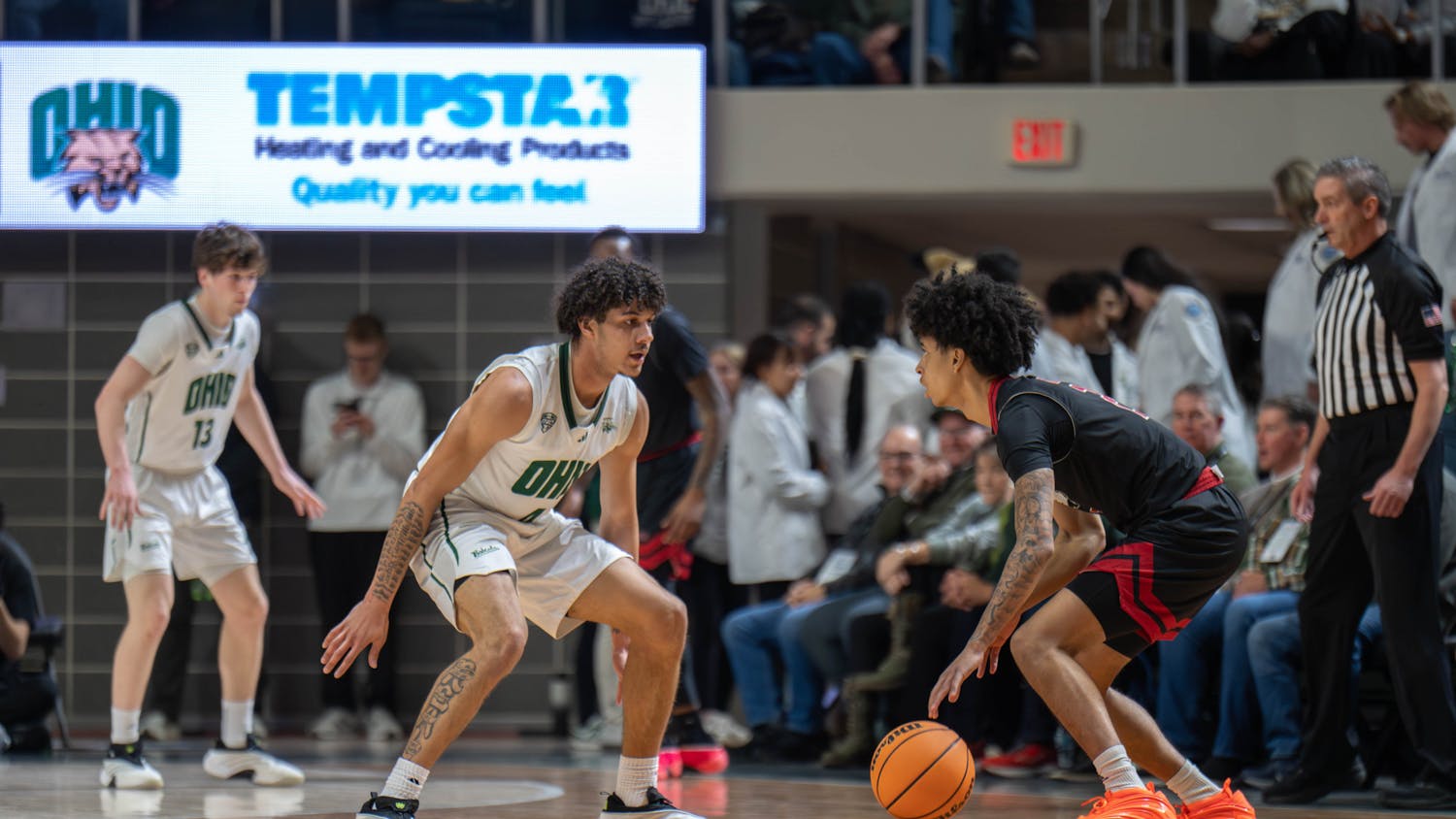Since the COVID-19 pandemic struck, Ohio University has lost almost 200 faculty members through firings and two rounds of buyouts.
Joe McLaughlin, associate professor of English, said the College of Arts and Sciences, Communications and Fine Arts had the most loss in faculty through the firings and buyouts. He said there are little to no efforts to rebuild, and the lost faculty members’ positions show no sign of replacement.
McLaughlin is the former president of OU’s chapter of the American Association for University Professors, or OU-AAUP, former chair of Faculty Senate and has served on OU’s Budget Planning Council.
In 2020, a Voluntary Separation or Retirement Plan, or VSRP, was made available to 608 faculty members, including most tenured professors, tenured associate professors and administrators with this title – except for faculty and administrators in the Heritage College of Medicine – on the Athens and regional campuses.
“Eligible faculty who elect to participate will separate from the university effective May 31, (2020), and will receive one year of their current base salary paid in four equal installments over an 18-month period,” OU wrote in an email sent to McLaughlin and other professors explaining the VSRP.
In the Spring of 2020, 53 instructional faculty were laid off, according to a previous Post report. McLaughlin said half of those were in the College of Arts and Sciences.
There were two rounds of buyouts, the first in 2020 and the second in 2022. These buyouts would lead to the departure of 139 faculty members from OU.
However, these buyouts were not distributed evenly throughout all the colleges and their programs.
“I don’t think they let many College of Business faculty or College of Health Sciences and Professions faculty take the buyouts, but just about everybody else could,” McLaughlin said. “It happened in ways that were really unpredictable.”
In the first round of buyouts, the College of Arts and Sciences lost 25 of its 289 eligible employees, with the College of Business losing five of only 60 eligible employees.
The second round of buyouts also affected the College of Arts and Sciences, which lost 26 of its 200 eligible faculty, and the College of Business saw no departures in the second round out of only eight eligible employees.
McLaughlin said he believes the university is hiring back faculty members at an incredibly slow rate. He said most of the hiring is instructional faculty rather than tenure-track faculty.
For the 2023 Fall Semester, the College of Arts and Sciences welcomed eight new tenure-track faculty and 14 new instructional faculty members, according to OU’s website.
“It seems every time you turn around, they’re creating a new vice president or associate vice president or associate provost,” McLaughlin said. “They certainly don’t seem to have any problems with increasing the number of people they’re hiring in positions of executive leadership and paying them at scales that are way beyond what they pay faculty.”
The university salary database shows the data of all non-student employees’ base salary pay as of December 2022.
In an email sent to faculty May 15, 2020, Provost Elizabeth Sayrs wrote that the economic impact of COVID-19 intensified financial pressures on OU that existed before the pandemic, which played a role in the firing of the 53 instructional faculty members. Sayrs wrote there was less of a need for faculty as the ratio of students to faculty had declined.
“Since 2016, the Athens campus student-faculty ratio has declined from 18:1 to 15:1,” Sayrs wrote in an email. “We must adjust across the University to reflect our current reality while ensuring that every student has the highest quality educational experience possible.”
OU’s current student-faculty ratio is 17:1, according to the university’s website.
Dan Pittman, a university spokesperson, said given the increasing enrollment in subsequent recent years, the university is putting effort into ensuring all students are given the same opportunities.
“We’ve seen significant increases in our incoming student populations across our residential, regional and online programs, and as such, we are making strategic and appropriate investments in both instructional capacity and the academic resources needed to further elevate the student experience,” Pittman wrote in an email.
However, some students have noticed the loss of faculty members and limited classes within their colleges and have started to voice their concerns to the Student Senate.
“I definitely have gotten a lot of complaints about cuts, especially in political science,” Student Senate’s Senator for the College of Arts and Sciences Ayshni Tandon said. “Throughout the College of Arts and Sciences, it is a very common term that everyone’s feeling like there’s a chronic lack of professors.”
Tandon said students in the political science program wrote a letter to OU administration in February, listing their complaints about the lack of professors and limited available classes in their curriculums. It received 146 signatures from students, but it didn’t receive a response from the president or provost.
“As students in Political Science, we see that the recent cuts to our department and the removal of multiple Political Science professors have been detrimental to our education here at Ohio University,” the letter reads.
It goes on to lament the losses of various classes, including LGBTQIA+ Politics, the Politics of Appalachia and Civil Liberties, in which students were concerned about what these cuts mean for OU’s stance on diversity.
“We know the leadership of the University has emphasized diversity,“ the letter reads. "Such a commitment to diversity would seem to entail ensuring that the University continues to offer courses such as these … Without this variety, many students feel as though the Political Science course offerings are not meeting their needs.”
Senate’s Academic Affairs Commissioner Dylan DeMonte said he thinks the way OU administration has handled students’ diversity concerns is inconsistent and performative.
He also said the university’s focus seems to be on advertising OU to incoming students rather than hearing out the concerns of enrolled students.
“I would say there’s been no influx of investment as far as bringing us back up above where we once were, especially in the liberal arts,” DeMonte said. “We understand that there's less resources and less staff in that department, but we're going to wrap it up in a way that we can try to make appealing to incoming students who actually do want to do that.’”
Student Senate Senator for the Patton College of Education Garrett Beam said the focus on certain programs receiving the fewest cuts translates into what colleges the university prioritizes.
“My experience is in K-12 education … at least when I was in high school, and even now as a student teacher, (I’m) seeing that STEM is really put first,” Beam said. “I think that’s starting to trickle down into higher ed or vice versa, where they are emphasizing STEM so much that it’s like, ‘If I don’t go into STEM, I’m not going to be successful.’”
Tandon said the university shouldn’t dismiss some majors because they may not be in a particularly high-paying field. After all, there is still a demand for all types of careers, she said.
“Maybe (the university is) not correctly gauging what they should be marketing to bring students in,” Tandon said. “It’s an increasingly social and political world, and education is becoming more and more important. These are things the job market is demanding.”
Students don’t always choose a field of study that may be in high demand, DeMonte said, but they shouldn’t feel deterred from picking a major because of the university’s lack of emphasis on it or the major’s potential career outcome.
“Universities should be a place where we push for an increase in knowledge or the pursuit of knowledge in every single area,” he said. “No matter if that means the career outcomes or not because it's important just to pursue knowledge in as many places as possible.“
DeMonte said the Student Senate sends out surveys to collect information on how students feel about the courses available within their majors. Using this information, his commission compiles a list of students’ complaints, and they meet with the deans of each college and try to address the issues.
He said whenever he meets with the provost or president of OU, he always asks for recommitment to liberal arts.
“I always get the response this (major) is always going to be here, but then there’s always an asterisk there,” he said. “They’re like, ‘Well, maybe if a major condenses down, we can wrap it up and turn it into something (else), or we can consolidate things.’ And that’s not what the students want.”
DeMonte said his hopes lie in making student voices heard by OU administration. He strives for equal attention to current students’ concerns, and less of a focus on increasing the university’s enrollment numbers.
“What needs to change is that the university needs to put more emphasis on what the current students are demanding, what the current students want out of their programs while they’re enrolled and not just when they enroll in it,” he said.






